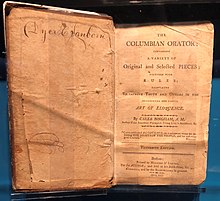19:
400:
132:, each of which the slave rebutted, until the master was convinced that the bondage was in fact unethical. The passage ended with the slave winning the argument and, therefore, his freedom. It can be assumed that the book's guidelines of oratory also contributed to Douglass's success as a public speaker;
403:
63:. It was popularly used for recitation in American schoolrooms from 1790 to 1820 to teach pupils reading and speaking. Typical of many readers of that period, the anthology celebrated "republican virtues," promoting
161:
The
Columbian Orator: Containing a Variety of Original and Selected Pieces Together With Rules, Which Are Calculated to Improve Youth and Others, in the Ornamental and Useful Art of Eloquence.
384:: Containing a Variety of Original and Selected Pieces, Together with Rules, Calculated to Improve Youth and Others in the Ornamental and Useful Art of Eloquence.
109:, self-taught writer and abolitionist Douglass praises the book as his first introduction to human history and eloquence. When he was 12 years old and still
439:
129:
389:
105:
444:
214:
378:
434:
340:
230:"I well remember, when I was a boy, how ardently I longed for the opportunity of reading, but had no access to a library",
190:
179:
429:
263:
18:
110:
27:
202:
128:
that demonstrated the intelligence of the slave. In this passage, the master presented the slave with
424:
118:
133:
124:
Douglass was particularly inspired by a dialogue between an enslaved person and his master in
91:
96:
8:
87:
386:
19th
Century Schoolbooks Collection, Digital Research Library, University of Pittsburgh.
308:
238:
83:
31:
346:
336:
210:
186:
175:
140:, of revolutionary fame, never made a speech more eloquent in the cause of liberty."
52:
48:
300:
218:
60:
43:
is a collection of political essays, poems, and dialogues collected and written by
171:
121:
was a bold denunciation of slavery, and a powerful vindication of human rights."
117:, and he "read over and over again with unabated interest ... What got from
418:
350:
231:
165:
137:
79:
72:
44:
206:
147:
363:
194:
114:
64:
312:
288:
136:
praised
Douglass in the introduction of his autobiography, claiming, "
330:
409:
304:
56:
332:
Narrative of the life of
Frederick Douglass, an American slave
198:
113:, he bought a copy using 50 cents which he had saved from
55:, and some imagined speeches by historical figures such as
78:
It is significant for inspiring a generation of
American
75:, containing examples for students to copy and imitate.
395:– "E Pluribus Unum Project," Assumption College.
237:"Every opportunity I got, I used to read this book",
150:
but also of the power of eloquence and articulation.
328:
264:"A Frederick Douglass Reading List | Jaime Fuller"
416:
47:. Published in 1797, it includes speeches by
67:and questioning the ethics of slavery. The
289:"The Active Virtue of The Columbian Orator"
185:Selected speakers include: Joseph Perkins,
106:Narrative of the Life of Frederick Douglass
286:
17:
440:Cultural depictions of Cato the Younger
417:
174:(Editor), Bicentennial edition 1998, (
324:
322:
287:Granville, Ganter (September 1997).
258:
256:
254:
82:, including orator and former slave
13:
14:
456:
445:Abolitionism in the United States
372:
319:
251:
398:
435:Cultural depictions of Socrates
357:
280:
1:
244:
329:Douglass, Frederick (1845).
146:became symbolic not only of
28:National Civil Rights Museum
7:
408:public domain audiobook at
94:, best known for her novel
10:
461:
153:
293:The New England Quarterly
225:
130:justifications of slavery
364:An Oration on Eloquence
134:William Lloyd Garrison
35:
430:Books about education
92:Harriet Beecher Stowe
21:
405:The Columbian Orator
392:The Columbian Orator
380:The Columbian Orator
144:The Columbian Orator
126:The Columbian Orator
40:The Columbian Orator
24:The Columbian Orator
88:Ralph Waldo Emerson
315:– via JSTOR.
268:Lapham’s Quarterly
239:Frederick Douglass
84:Frederick Douglass
36:
32:Memphis, Tennessee
390:The Influence of
342:978-0-14-310730-9
211:Benjamin Franklin
187:George Washington
97:Uncle Tom's Cabin
71:is an example of
53:Benjamin Franklin
49:George Washington
452:
425:1797 anthologies
402:
401:
366:
361:
355:
354:
326:
317:
316:
284:
278:
277:
275:
274:
260:
219:Cato the Younger
69:Columbian Orator
460:
459:
455:
454:
453:
451:
450:
449:
415:
414:
399:
375:
370:
369:
362:
358:
343:
327:
320:
285:
281:
272:
270:
262:
261:
252:
247:
228:
172:David W. Blight
168:(Editor), 1797.
156:
12:
11:
5:
458:
448:
447:
442:
437:
432:
427:
413:
412:
396:
387:
374:
373:External links
371:
368:
367:
356:
341:
318:
305:10.2307/366763
299:(3): 463–476.
279:
249:
248:
246:
243:
227:
224:
223:
222:
215:Jonathan Mason
191:Paulus Emilius
183:
169:
163:
155:
152:
9:
6:
4:
3:
2:
457:
446:
443:
441:
438:
436:
433:
431:
428:
426:
423:
422:
420:
411:
407:
406:
397:
394:
393:
388:
385:
382:
381:
377:
376:
365:
360:
352:
348:
344:
338:
334:
333:
325:
323:
314:
310:
306:
302:
298:
294:
290:
283:
269:
265:
259:
257:
255:
250:
242:
240:
235:
233:
232:Caleb Bingham
220:
216:
212:
208:
204:
200:
196:
192:
188:
184:
181:
180:0-8147-1323-8
177:
173:
170:
167:
166:Caleb Bingham
164:
162:
158:
157:
151:
149:
145:
141:
139:
138:Patrick Henry
135:
131:
127:
122:
120:
116:
115:shining shoes
112:
108:
107:
101:
99:
98:
93:
90:; and author
89:
85:
81:
80:abolitionists
76:
74:
73:progymnasmata
70:
66:
62:
58:
54:
50:
46:
45:Caleb Bingham
42:
41:
33:
29:
25:
20:
16:
404:
391:
383:
379:
359:
331:
296:
292:
282:
271:. Retrieved
267:
236:
229:
207:James Hervey
160:
159:Full title:
148:human rights
143:
142:
125:
123:
104:
102:
95:
77:
68:
39:
38:
37:
23:
15:
203:Thomas Muir
86:; essayist
419:Categories
273:2021-03-21
245:References
195:Hugh Blair
65:patriotism
22:A copy of
351:850209991
410:LibriVox
241:, 1845.
234:, 1803.
119:Sheridan
111:enslaved
57:Socrates
154:Details
103:In his
26:at the
349:
339:
313:366763
311:
226:Quotes
217:, and
178:
309:JSTOR
199:Philo
347:OCLC
337:ISBN
176:ISBN
61:Cato
59:and
301:doi
30:in
421::
345:.
335:.
321:^
307:.
297:70
295:.
291:.
266:.
253:^
213:,
209:,
205:,
201:,
197:,
193:,
189:,
182:).
100:.
51:,
353:.
303::
276:.
221:.
34:.
Text is available under the Creative Commons Attribution-ShareAlike License. Additional terms may apply.
